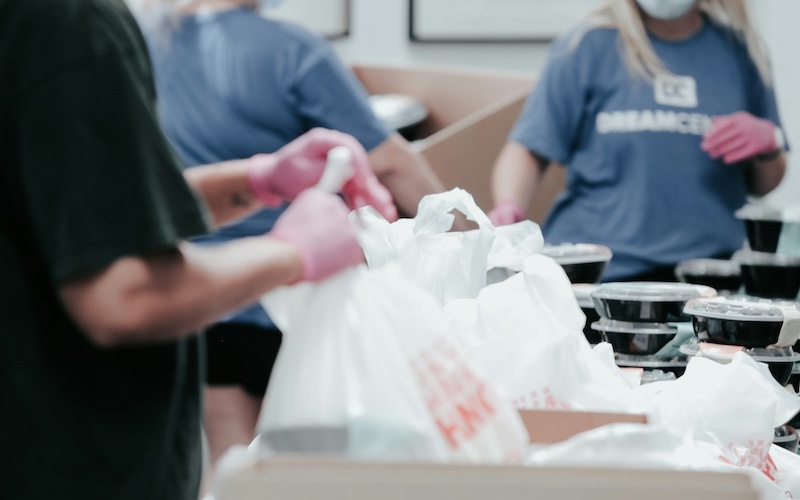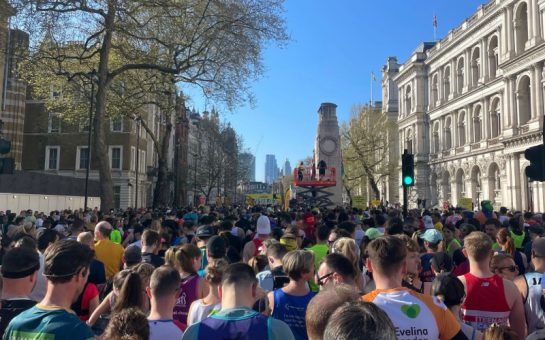The total number of food parcels distributed across London have more than tripled in the last seven years, data produced by food bank charity, The Trussell Trust has revealed.
End of year data released by the Trust shows that there has been a 231% increase in food parcels distributed by Trussell network food banks across the city since 2017.
In the last full financial year (2023-2024), the Trust provided nearly half a million emergency food parcels across London, with a record 162,418 of these parcels given to children alone.
Camden saw the most food parcels delivered in the past year, at 66,776 parcels, while Ealing, Barnet, Hammersmith & Fulham and Lambeth also recorded increasingly high distribution levels.
The charity has developed a ‘hunger and hardship’ indicator to track both current and future needs for emergency food and stressed the need for government action to tackle food insecurity across the UK more effectively.
Trussell Senior Policy and Public Affairs Manager Beatrice Orchard said: “We have amassed a huge amount of insight and data and research over the years that tells us that food insecurity and hunger is very much about a lack of sufficient income rather than a lack of access to food, and our vision is a future without the need for food banks.
“We are really looking for solutions to try and make sure that people don’t need to turn to food banks.”
She also stated that without policy change, a further 425,000 people across the UK will suffer from hunger and hardship over the coming years, with children making up 40% of those.
The cost of living in the UK has been on the rise since 2022, and the Office for National Statistics estimates that the expense of consumer goods and services has increased by 9.6% in the year leading up to October 2024.
This has also been reflected in attitudes towards food and eating habits, and the Food Standards Agency’s recent consumer insights tracker revealed that many participants were concerned about food prices, the quality and healthiness of food and food insecurity in general.
Crystal Lewis, 43, who lives in Streatham, found herself in debt when she lost access to Universal Credit after returning to the UK from Trinidad in January 2022, and has since struggled to provide for herself and her son, who has autism.
She said: “It’s a real struggle, the cost of food is ridiculous, and I have no choice sometimes but to have one meal a day, often just some ramen noodles.
“I know a lot of people would say you can just go to food banks, but it’s not always that easy.
“In my situation, I had to search to find where the food banks were, and then the food was heavy and the closest food bank to me was in Brixton, but I didn’t have anyone to help me get it back.”
The data also revealed a 46% post-pandemic increase in the amount of food parcels delivered to children across London from 2019/2020, with Camden totalling 22,245 in the last year, the highest across the city.
Susie Baker, Chief Executive of Home-Start Lambeth, which offers support to parents across the borough, emphasised the added pressure placed on dependent households to keep their children healthy, while also juggling the constraints of food insecurity.
She said: “Sometimes we have single parents referred to us who are the main carer for their own parents, and also have a baby, and have no money and haven’t slept in weeks, but would also quite like their kids to have some fruit this week.
“Households with dependents such as children are twice as likely to experience problems with affording or getting food.”
She also highlighted the many factors which contribute to food insecurity, such as long housing waiting lists across Lambeth, and limited access to storage or cooking facilities.
“If you’re sleeping in a single bedroom with two or three children, while sharing a kitchen and waiting to be housed, that is also going to inform your food choices.
“It’s not just about getting food, and it goes so much further than just going to a food bank.”
Lambeth has one of the highest rates of food parcel deliveries across the UK, recording 27,473 parcels distributed in 2023/2024.
Mona Boateng, Assistant Project Manager at Lambeth South and Croydon Foodbank also spoke of the need for more infrastructure in the borough, to better support those struggling.
Boateng said: “Recently, our Streatham and Brixton hubs have seen an increase in foot traffic and will often have to stay open an hour or so later than usual.
“The lack of holistic support in Lambeth has a part to play, but equally there are a lot of people coming into the borough, and unless the services complement that, nothing will help, which is reflected in the increase in food parcels.”
The new Labour government’s recent budget set out plans for a Fair Repayment Rate in Universal Credit and a year’s funding for the Household Support Fund, both of which are hoped will be decisive steps to help people out of financial crises, and simultaneously, out of food poverty.
Orchard added: “Some early announcements that the government has made are positive and form part of what needs to change to get to a future where people don’t need to turn to a food bank to feed themselves and their family.”
The Trust does not have recorded data for the City of London, Tower Hamlets or Waltham Forest and is not representative of all food banks across London, only revealing statistics for the more than 1,400 food banks in the Trussell community across the UK.
For more information, or for help accessing food banks, go to https://www.trussell.org.uk/emergency-food.
Featured image credit: Unsplash





